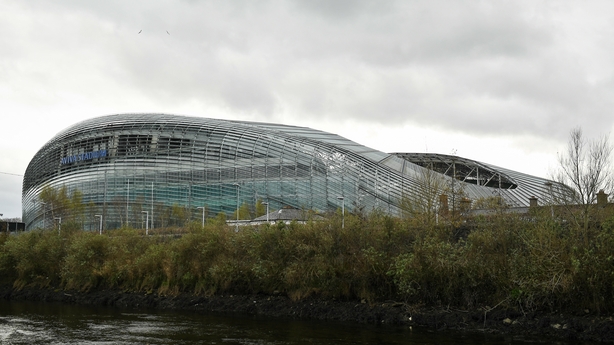With the UK and Ireland now the sole bidder to host the 2028 European Championships, formal ratification will come on Tuesday morning at UEFA Headquarters in Nyon, Switzerland.
Initially a five association feasibility study was commissioned to the 2030 World Cup, with the FAI joining the four UK associations in the winter of 2018. A joint Spain/Portugal bid quickly emerged as a strong favourite to host the World Cup, and so the focus switched to Euro 2028.
The FAI will present what they call a 'compelling' proposal to UEFA's Executive Committee. In their submission bid the socio-economic benefit to Ireland of staging the tournament was estimated at €241 million.
Last week, speaking on RTÉ's News at One, Minister of State for Sport Thomas Byrne told Bryan Dobson that "there is State funding involved (in the bidding process), when the State funds major events a very detailed cost benefit analysis is done to make sure we are getting value for money."
Security costs around the staging of the tournament will be the main financial outlay.

The Aviva Stadium had been due to host four games at Euro 2020, the tournament being then delayed by a year due to Covid. UEFA ultimately moved the three group games scheduled for Dublin to St Petersburg, and one last 16 game to Wembley. The FAI and the Government were unable to provide guarantees regarding the requirement for 25% capacity spectator attendance.
It's understood Dublin will stage at least six Euro 2028 games, four in the group stage, one in the last 16, and one quarter-final. The yet to be redeveloped Casement Park in Belfast is in line to host at least five fixtures.
Five hosts will not mean five automatic qualifiers for the 24 Nation tournament. UEFA have yet to formalise the qualification format. The indications are that the five host nations will compete in the normal qualifying campaign, with the safety net of two wild card spots held in reserve for the nations that fail to qualify automatically.
There are those within the game domestically that will regard the staging of a major tournament as a distraction. FAI CEO Jonathan Hill will no doubt address those concerns when he speaks to the media in Nyon.
In April the association launched their 15-year strategic analysis and vision report, with an ambitious €863m plan to modernise facilities and standards in Irish football.
Football fans will hope that hosting the Euros will contribute to elevating the game in this country to the next level.
Watch Republic of Ireland v Greece in Euro 2024 qualifying on Friday from 7pm on RTÉ2 and RTÉ Player, follow a live blog on RTÉ.ie/Sport and the RTÉ News app and listen to live radio commentary on 2fm's Game On
Listen to the RTÉ Soccer podcast on Apple Podcasts, Spotify or wherever you get your podcasts.


